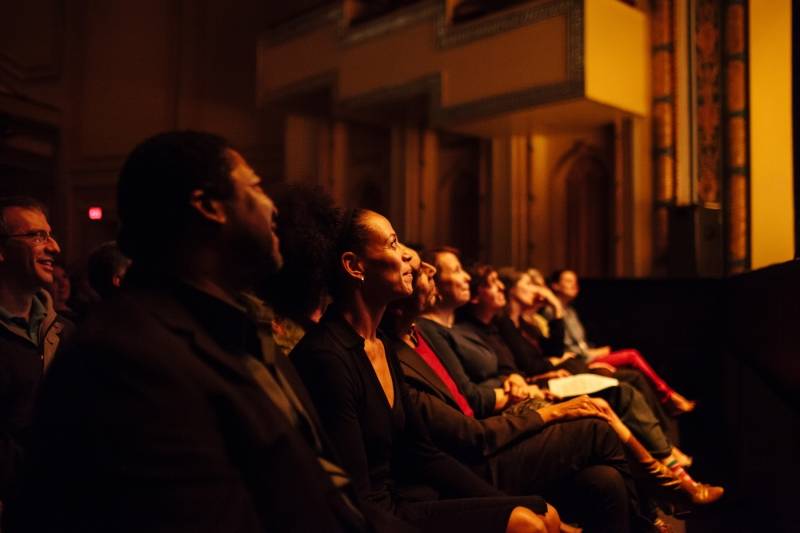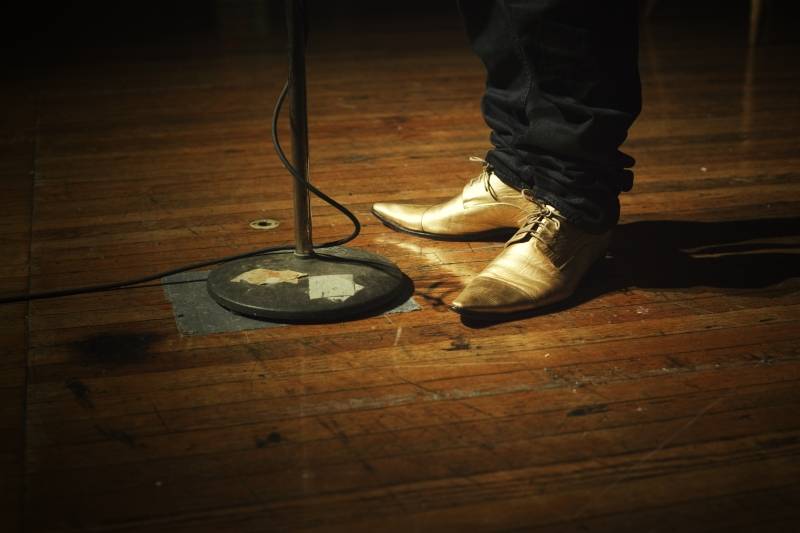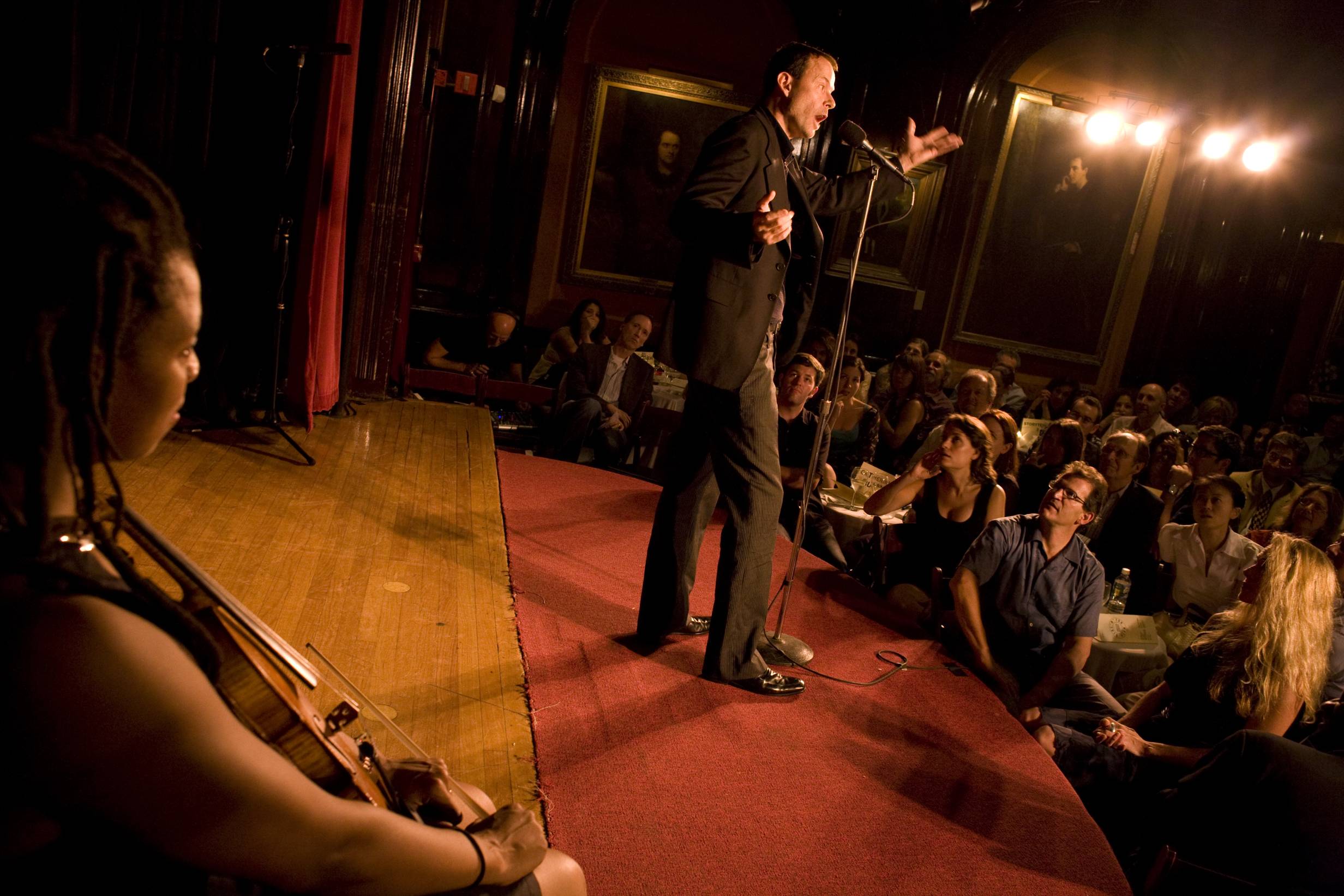This Saturday, a series of gifted storytellers will take to the stage of the Virginia Theater as it welcomes the renowned organization The Moth for their mainstage event Intrepid: The Moth in Champaign. Each storyteller will share an 8-10 minute personal narrative describing an influential event or period of their lives that will somehow relate to the night’s “intrepid” theme, though perhaps not always in a predictable fashion.
The announcement that The Moth was coming to Champaign immediately generated a lot of buzz thanks to their reputation as one of the most well-known promoters of the art of storytelling in the United States. The Moth hosts hundreds of live storytelling events nationally each year, their radio show airs on over 400 stations around the world, and their podcast was downloaded over 30 million times last year. All the stories shared are personal first-person experiences and The Moth works closely with storytellers to help them develop and fine-tune their stories before presenting them to a live audience.
At its best, The Moth introduces its audiences to a wide range of perspectives in an accessible and affecting way. It’s rare that research for a Smile Politely Arts article makes me cry, but as I listened to recent episodes of The Moth Radio Hour I found myself reaching for the tissues time and time again. (I’m not at all embarrassed by this. I defy anyone to get through that recent one about the heartbroken guy and the “unadoptable” dog without tearing up.) The Moth consistently provides its audiences with emotionally powerful stories that never feel preachy or manipulative…not an easy feat to pull off.

Prior to this weekend’s event in Champaign, Smile Politely chatted with one of The Moth’s senior producers as well as two storytellers who have participated in past Moth events.
 First up, director Meg Bowles, a senior producer and co-host of The Moth Radio Hour.
First up, director Meg Bowles, a senior producer and co-host of The Moth Radio Hour.
Smile Politely: How did you first get involved with The Moth?
Bowles: I met the founder, George Dawes Green, one afternoon through mutual friends back in 1997. He invited me to an evening of storytelling he was hosting at Lansky’s Lounge — an old speakeasy behind Ratner’s Deli on the Lower East Side of Manhattan. I remember the room was packed! I heard stories from Malachy McCourt and Jonathan Ames and after that first night, I was hooked. I started helping the then Artistic Director curate evenings by finding people who would be willing to share their stories.
SP: What do you enjoy most about your job?
Bowles: The thing I love most about The Moth are the people I get to meet and work with; I am often humbled and moved by their stories. Every story I work on connects me to another person —another soul— and as a result I have met and become friends with so many amazing and interesting people.
SP: What is the theme for the Champaign Mainstage and what can you tell us about how that theme was chosen? In general, how do you go about identifying a theme for a particular location?
Bowles: The theme for Champaign is Intrepid: The Moth in Champaign. The theme came about because of the combination of stories. They all had some sort of fearlessness — some aspect of being bold and brave so the word “Intrepid” felt appropriate.
The themes tend to frame the evening of stories we are presenting. We try to select a theme that will support all of the stories. This can often be difficult, so we try to find themes that allow us to explore many different angles.
SP: The Moth has brought audiences over 20,000 stories over the years. What qualities do you think make for the best and most memorable stories?
Bowles: The thing I love about any Moth evening is that everyone leaves the theater with a different “favorite” from the night. What might be memorable for one person, may not always be the story another person connected to. But the one thing I have found over the years is that if a person is authentic and real, the audience will forgive any bumps or forgotten lines. If they are willing to stand up and share a story from their life and be human — flaws and all — the audience will lift them up and cheer them on. I remember once, we were producing an evening of stories in New York City: one of the storytellers was a recent high school graduate and when she took the stage, she got so nervous she completely forgot her story. The room fell silent but everyone was right there with her — silently cheering her on — and then, out of the silence, I heard the voice of former Mayor Ed Koch. In his unmistakable voice, he said “It’s okay dear, take your time” and the whole audience erupted in applause. The storyteller found her footing and carried on and was a huge success!

SP: We live in an age where many of us most frequently consume stories through screens in a fairly passive and isolated manner. What do you think still attracts modern audiences to attending live storytelling and to receiving stories in a group setting?
Bowles: There is an energy and connection that you feel, sitting in a room, listening to other people tell you about their lives. You feel connected to the storyteller, who often feels like a friend sharing tales over dinner. And you feel connected to those seated around you because you are all sharing in the experience — you are all at that same dinner table. It brings you together in a very real way, beyond [how] any likes or emojis could ever do. I often tell a storyteller to let a story unfold the way it happened for them: just try to remember the memory and let the audience feel the moment unfold. Often someone from the audience will tell me that they felt a chill or their stomach dropped when the storyteller shared a specific detail — and when a room full of people can experience something like that together, it is truly special.
SP: Finally, what advice would you give to someone wondering if they have a “Moth-worthy” story in them?
Bowles: At the Moth we always say everyone has a story. Sometimes the stories are big, sometimes they are small, but we all have moments in our lives that impacted us — that stick with us — and looking at those moments is often the best place to start when trying to decide what story you might want to tell. And if you do have a story you want to share: PITCH US! Go to our website, the moth.org, and look for “Tell a Story” where you can find a step by step guide for how to pitch a two minute story, either by phone or through our website. We listen to every pitch! In fact one of the storytellers in the Champaign show came to us via the pitchline!

We also chatted with two experienced Moth storytellers, retired Army Colonel Jill Morgenthaler and comedian David Montgomery, to get their perspective from behind the mic. Both will be sharing their stories in Champaign on Saturday.
SP: How did you first get involved in storytelling and particularly in The Moth?
Montgomery: I listened to a storytelling show called Risk! and evangelized it to my friends and colleagues. The stories were funny, sad, scary, heartwarming — but above all, they were true. A colleague of mine turned me on to the Moth and all but pushed me in front of a microphone. I was terrified of public speaking but when I saw how accepting and supportive The Moth audience was at my first StorySlam, I was at ease. I ended up winning that night but left with a full heart from the other stories I had heard that night.
Morgenthaler: I was a voracious reader and loved stories. As a rather shy person, I found that I came out of my shell when I told stories. When I started speaking on the stage, stories made the connection between the audience and me. A fellow speaker told me that to improve my craft I needed to listen to The Moth. The first time I did, I was blown away. I immediately subscribed.
SP: What have you learned about the art of storytelling through your experiences with The Moth so far?
Montgomery: I’ve learned that when you’re sharing your experience with an audience, you need to paint them a picture in every way. The sights, the sounds, and “the feels”: both physical and emotional. They are on your side when they can truly sympathize with what you’ve gone through, imagining themselves in your shoes. Storytelling isn’t always about some grand thing that you’ve done. It can sometimes be the smallest act that proved to be monumental in your development of emotion or of your character. Sometimes “sweating the small stuff” can make for an amazing story.
Morgenthaler: The Moth is a conversation with an audience seen and unseen. Conveying emotions is one of the vital components (which I still have a hard time with because, as a daughter of a Marine and a soldier, I was never encouraged to share how I felt). When I’m on stage, I act out my stories but for The Moth, I’m just telling a friend over the dinner table something that happened to me.
SP: What have you learned about yourself through your storytelling?
Montgomery: It sounds cliche, but I’ve learned that my voice does matter. As I said, someone all but pushed me in front of a microphone because I thought that everyone would hate it or wonder why I’d bother to share. Before long I was addicted to that energy. The writing process is fun, but the way people individually connect with my stories for so many different reasons still amazes me. One story can elicit someone coming up to me crying, laughing, or anything in between. I’ve always thought of myself as an outsider, but storytelling has taught me how much more I have in common with so many people than I thought.
Morgenthaler: [I learned] that I wasn’t a natural leader, I was a sponge. I absorbed so much from my father and mother when it came to leadership.
SP: What advice would you give someone just starting to dabble in live storytelling?
Montgomery: Without a doubt, give it a go! Storytelling audiences, those of The Moth most particularly, are the most supportive people. Unlike critics or standup crowds, they are always on your side. They’re ready for you to take them on a journey, big or small. They honor your perspective and are incredibly encouraging. Besides, you probably owe it to yourself to be able to retell that moment of glory to your grandkids one day!
Morgenthaler: Be honest and go deep into your psyche.
SP: And in 1-2 sentences, tell someone on the fence why they should definitely attend The Moth Mainstage in Champaign.
Montgomery: The tag line says it all; 5 incredible stories, live on stage, without notes. The show always runs the gamut, with storytellers ranging from African refugees to astronomers to Spice Girls fanatics.
Morgenthaler: You will laugh and you will cry. You will be stirred by the humanity and heroism shown in the stories. You will understand that we all have stories to tell.
—
In addition to Montgomery and Morgenthaler, this Saturday’s storytellers will include Micaela Blei, Ali Abdullatif, and Victor Levenstein.
“Intrepid: The Moth in Champaign” takes place at the Virginia Theater (203 W. Park Avenue, Champaign) at 7:30 PM on Saturday, March 4th. Tickets range in price from $19.50-$39.50 and be purchased online here or in person at the box office between 10 AM and 5:30 PM Monday-Friday. The box office can be contacted by telephone at 217-356-9063.








